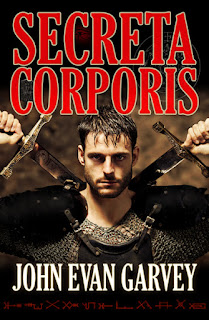Following is the query letter.
7 August 2013
Ms. Knight,
My gay historical novel, Secreta Corporis, has the misfortune of being gay and literary (simultaneously, yes) while the subject matter (the Knights Templar in the Holy Land) seems to place it in the adventure or thriller genres. When I started the project in 2006, substituting the male archetype of "cowboy" presented in Brokeback Mountain with the similarly archetypal "knight" seemed like a good idea at the time. I set the story after the Third Crusade, during the three-year truce, so that there would be no need for battle scenes and the story could focus on the relationship between the two knights. The appearance of Templars in the story, however, incorrectly signals to readers of literary fiction that this isn't their kind of book, and it has attracted a few readers of genre fiction who have thought that my novel was the dullest 'thriller' they've ever read. It's a problem of positioning that is beyond me to solve, and so I'm turning to you, who seem uniquely abled and situated to take on a project like this.
Ordinarily I wouldn't bother you with this project; I'd just wave the white flag and move on to some new creative project. But I was lucky enough to obtain, at my request, a short but favorable review of my book from Michael Nava (author of the Henry Rios novels and the forthcoming historical novel, The City of Palaces):
Secreta Corporis is, in the tradition of The Name of the Rose, a marvelously erudite novel that brings the past to life in all its complexity while engaging the reader's sympathy in the love story of Rolant and Audric, Knights Templar, as they travel in and around the Holy Land at the end of the 12th century. Garvey's book immerses the reader in Rolant and Audric's world while never losing sight of the deep bond between them that is the heart of the story. This is not the cartoon version of the past readers get in so many historical novels but a rich and detailed landscape in which the reader can happily lose him- or herself. I highly recommend it.After I emerged from the coma, I emailed Michael to thank him and expressed my surprise at such a glowing review. He responded "...Years later when I met [Joseph Hansen] and asked him why [he had written a glowing review of his book], he said, basically, 'because it was a good book.' You have written a good book. It may not find the audience it deserves but this is one appreciative reader who wishes it and you well." I'm hoping that an assessment like this from a known source, a known quantity, will encourage you to see the potential in my book. The book can be found on its product page at Amazon. A synopsis and Chapter One are below, and the manuscript in PDF form is attached.
Thanks very much.
John Garvey

